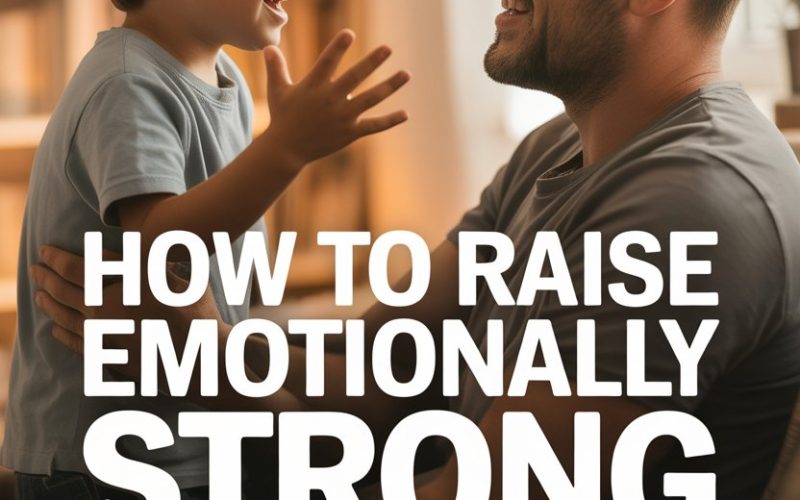Ever wished your son would tell you how he’s actually feeling, instead of mumbling “fine” with the emotional complexity of a potato? You’re not alone.
Raising emotionally strong boys isn’t about turning them into therapists-in-training, but helping them build real skills for life—the kind that last longer than the batteries in their remote-control cars.
Get Comfortable With Feelings (Even the Weird Ones)
Boys experience the full rainbow of emotions, not just the two that tend to get airplay (anger and, uh, that other kind of anger).
The trouble is, boys are often taught—by playground culture, relatives, or even teachers—to toughen up, shrug it off, or zip it.
Try narrating feelings openly and often. When your son’s frustrated by a tricky maths problem, instead of “Don’t get upset, it’s not a big deal”, try “Looks like you’re frustrated. I get that—it’s hard when things don’t click straight away.”
By simply naming feelings, you’re giving your son permission to have them. The world won’t end if a boy gets teary over a lost football match. Promise.
Model Emotional Expression (Yes, Even You, Dad)
The best way to convince boys that feelings aren’t shameful? Show them. This doesn’t require weeping during every episode of Bluey.
It can be as simple as, “I had a stressful day at work—I’m feeling a bit anxious,” or, “I’m really excited about our movie night.”
Children, like miniature scientists, learn by observing.
If boys witness their parents expressing disappointment, joy, or even embarrassment (hello, tripping at school pick-up), they learn that feelings come and go. And that nobody explodes from embarrassment. Not even you.
Rethink “Be a Man” and Other Outdated Phrases
The phrase “be a man” gets thrown around like confetti at a wedding, but it’s about as useful as a chocolate teapot. Research from the American Psychological Association confirms that rigid gender norms can harm boys’ mental health and relationships.
Ditch language that shames boys for being sensitive, scared, or sad. Instead, talk about what real strength looks like: telling the truth, asking for help, and admitting mistakes.
The bravest thing a boy can do? Be himself—even if that means he wants to wear pink socks or quit rugby for drama club.
Create a Safe Space for Conversations (No Interrogations)
Ever tried to get a boy to open up about his feelings? It’s about as subtle as finger-painting with ketchup. Instead of “How was your day? What did you feel? TELL ME EVERYTHING!”, aim for low-pressure chats.
Car rides, bedtime, or while stacking the dishwasher all work wonders.
Ask open questions: “Was there a moment today that made you smile?” or “Did anything at school annoy you?”
Sometimes, silence is golden—let them stew, then come back to it later. Not every feeling has to be dissected in real-time.
Teach Healthy Coping Skills (Not Just ‘Walk It Off’)
Tears during a meltdown? That’s not weakness—it’s the human condition. Boys benefit from knowing they have options when emotions run hot.
Introduce simple strategies: deep breathing (try “smell the flowers, blow out the candles”), squeezing stress balls, drawing, running outside, or even having a good old-fashioned sulk.
Dr. Lisa Damour, a psychologist specialising in adolescence, recommends teaching boys to notice what soothes them. Maybe it’s music, kicking a ball, or disappearing into a book.
The trick is helping them find healthy outlets, rather than bottling it up until someone’s sibling ends up with a flying Lego brick to the head.
Normalise Mistakes and Apologies
Perfection is overrated. Boys need to know that messing up doesn’t make them failures—it makes them human.
If your son loses his temper and shouts, resist the urge to shame him. Try, “You were really angry. What do you think you could try next time?”
And when you get it wrong (yelling over muddy shoes, anyone?), apologise. “I shouldn’t have snapped—I was stressed. Sorry, mate.” Hearing adults own their blunders gives boys permission to do the same, minus the guilt spiral.
Encourage Friendships That Allow Real Connection
Boys are often nudged towards competitive friendships—who’s fastest, strongest, loudest. But emotional strength blossoms in relationships where boys can be themselves.
Help your son spot friends who listen, laugh, and stick around even when times aren’t rosy.
Invite his mates over for a movie or footy, but also for lower-key activities like baking or gaming. If you notice unkindness or teasing, talk it through: “How did you feel when Tom joked about your drawing? Did it bother you?”
Sometimes, boys need help navigating the politics of friendship—and learning that vulnerability is not a weakness.
Show Him All Kinds of Role Models
Superheroes are grand, but boys need more than capes and catchphrases. Introduce them to books, films, or real-life stories featuring men who show compassion, creativity, or courage—not just brawn.
The Good Men Project offers stories about men who challenge stereotypes and value empathy.
Share tales of men facing setbacks, making amends, or owning their mistakes. Uncles who cook, teachers who cry at graduation, dads who dance at parties—these are the role models that broaden a boy’s definition of strength.
Make Room For Quiet Boys Too
Not every boy wants to belt out his feelings in song. Some prefer to process silently, or express themselves through art, sport, or even building a city out of toilet rolls. Respect his pace.
If your son’s naturally reserved, celebrate that gentleness. Don’t push him to “man up” or “speak up” if he’s just not built that way.
Introverts can be emotionally strong too—they’re just not as noisy about it.
Use Books, Movies, and Media as Conversation Starters
Storytime isn’t just for toddlers. Books and movies are sneaky ways to get boys thinking and talking about feelings. When a character struggles or celebrates, ask, “How do you think he felt?” or “What would you have done?”
Pick stories where boys cry, apologise, get scared, or ask for help. There are brilliant reads out there—like Wonder by R.J. Palacio or The Boy at the Back of the Class by Onjali Q. Raúf—where boys are brave, vulnerable, and thoroughly human.
Movies like Paddington 2 or Inside Out (yes, even if he claims he’s too old for cartoons) can open doors to conversations about sadness, empathy, and more.
Watch Your Words and Reactions
It’s easy to blurt out, “Stop crying, you’re fine!” after the seventeenth stubbed toe of the week. But words matter. Tune in to your knee-jerk responses.
Instead of “Don’t be such a baby,” try, “That looks like it hurt. Want a cuddle or some space?”
Your tone sets the bar for how your son treats himself when he’s struggling. Compassion, not criticism, paves the way for emotional strength.
Teach Problem-Solving, Not Problem-Hiding
When trouble brews—a playground squabble, a lost toy, a math grade gone sideways—resist swooping in like a rescue helicopter. Ask guiding questions: “What could you try next time?” or, “Is there anyone you trust at school to help?”
Problem-solving builds resilience. Plus, it’s easier on your blood pressure than refereeing every spat.
Check Your Own Baggage
Parenting brings out the best and, sometimes, the weirdest bits of our own childhoods.
If you were told to toughen up, you might unconsciously repeat it. Pause and ask: where did your ideas about boys’ emotions come from? Are they helping, or hindering?
Therapists like Steve Biddulph emphasise that raising emotionally strong boys starts with grown-ups doing their own emotional homework (oops—self-reflection!).
Don’t Panic About the Tears (Or the Silence)
Boys will cry. Boys will sulk. Boys will sometimes hurl themselves onto a beanbag and refuse to explain why.
It’s not failure, and it’s not the end of the world. Allow the feelings, offer a safe lap or a snack, and trust that you’re building his emotional muscles for later.
Tears now mean fewer meltdowns when life hands him adult-sized problems.
Trust That You’re Making a Difference
You won’t get it perfect. There will be days when your son grunts from behind his fringe, or when he surprises you with a hug and a “thanks.”
Raising emotionally strong boys is a long game—one that pays off when your grown son can own his feelings, support his mates, and ask for help without shame.
He might even call you just to talk about his day.
Maybe.
Why This Matters More Than Ever
An emotionally strong boy grows into a man who doesn’t explode, implode, or ghost the family WhatsApp chat. He’ll know how to admit when he’s wrong (occasionally), ask for help, comfort friends, and bounce back from setbacks.
That’s not just good for him. It’s good for everyone who loves him.
And if all else fails, there’s always chocolate.
Or hugs. Or, on particularly trying days, both.




